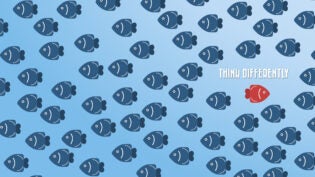Home > Run and Grow > Innovation >
Why We Have Fewer Choices in a World of Wider Choice
By: Dave Brock

Whether as individual consumers, or organizations, there’s an interesting paradox. The number of choices we have is expanding at a huge rate—sometimes the rate of change and volume of choices is overwhelming.
At the same time, often unwittingly, we are narrowing and having our choices narrowed—and perhaps in ways that create unintended consequences, or can be very damaging.
Before I go forward, I need to give a couple of illustrations, so you can follow my thinking.
If you look at my Amazon account, my whole world of reading and literature is covered by the following categories: Biographies (tending towards business and military leaders), Business (tending toward leadership, strategy, innovation, sales, marketing, customer leadership), and Mystery Thrillers (yep, need some trashy stuff to read on those long plane flights).
Every day when I sign into Amazon, I get recommendations on books that might be interesting. Those books are based on my past purchases and searches, most of which are in those categories. For all intents, they represent the world of publishing to me.
Last weekend, my mother and I were exchanging ideas on books. It turns out she reads History, Sociology, Biographies (but different categories than mine), Philosophy, and Mystery Thrillers (maybe there’s a genetic link).
So her whole world of books was, for the most part, different than mine. Looking at her Amazon accounts, I saw completely different recommendations. But what was striking, a lot of those books were really fascinating, and I immediately downloaded half a dozen and am devouring them.
Without that conversation, I would have been totally ignorant of a broader world of books, reading and knowledge. All because Amazon’s analytics and my behavior were feeding each other—rather than broadening my perspective, it was sharply narrowing my perspective.
Related Article: Unlock Big Data for Your Small Business
Likewise with music, my tastes tend to Metal, Rap, Jazz, and some Classic Rock. Consequently, Spotify, SoundCloud, iTunes make recommendations in those genres.
But yesterday I took a taxi from the airport to my hotel. The taxi driver was listening to this really cool music, I asked, “What’s the name of that group? Is it a new variety of metal, perhaps a fusion of metal and jazz?” He replied, “It’s the Cleveland Symphony playing Beethoven…” I thought to myself, “Gee that’s a cool group, I’ll have to look them up, see if I can catch this Beethoven guy in concert. I think he’s the keyboard guy in the group, but perhaps he plays bass or lead guitar as well.”
Again, with the help of analytics and my behavior, I was missing a world of music that was actually quite interesting, but that I would have never found except by accident. I actually become a narrower, smaller person, less aware of a broader world view and differences.
You can start seeing where I’m going. Analytics offer us tremendous power. They can help us understand our customers, their interests, their behaviors. We can construct contexts based on what our customers do, that become increasingly narrow—all in the hope of being more relevant, impactful and meaningful to our customers.
Leveraging analytics, we can look at what our customers/prospects have done, we can couple that with what they are doing now, then we can leverage that to predict what the may be doing—as a result shaping what we provide, how we communicate, how we position what we communicate in a context that is highly impactful and relevant to our customers. The goal is getting them the information they need to shape their buying decision at the moment they decide to purchase.
All to make their lives easier, all to align our engagement and experience strategies more closely with them. All with the hope of building deep relationships, helping them buy the right stuff-preferably from us, creating great loyalty.
And the search engines are helping, as well. As they look at our customers’ histories of search, they narrow and prioritize the options based on who they are, where they are, and their past history.
All of that is tremendously helpful to our customers, except when it’s not. We run the danger of “systematized tunnel vision.”
What if we are searching for the wrong things? What if we are unaware of wholesale shifts in markets and industries and are looking at things in the same old way we have?
How do we consider innovation, transformation, and thinking out of the box, when our boxes are getting increasingly contracted, restricted, and smaller—all based on analytics?
We do it to ourselves naturally—we analyze our markets, our customers, our industries. We look closely at our competitors, either copying them or trying to jump ahead of them. We become prisoners of our experience, and our search, our engagement on the web can further reinforce and narrow that perspective.
But disruption rarely comes from within our own industries and markets. It comes from the outside and interrupts what everyone—customers, competitors, and we are doing. It turns things upside down
Innovation and transformation require us to look at things in new and different ways, exposing ourselves to ideas, concepts, principles, and experiences often far removed from our day to day worlds.
Instead of thinking more broadly and globally, we start becoming more provincial and narrow in our thinking and our views (from a societal point of view this is really scary). We in fact create isolated “fiefdoms, virtual villages, virtual communities” that look very much like feudal, pre-Renaissance society.
I think there is a solution, surprisingly, I think analytics can help us develop the solution and engage customers in very powerful and innovative ways. It’s actually moving from predictive to prescriptive analytics.
Going back to my reading and music examples, perhaps we can leverage analytics so Amazon suggests, “Dave, you are stuck in a rut, have you ever considered modern economics or European history?” Or Spotify suggests, “Dave, you’d benefit by broadening your taste in music, here are some classics, along with Taylor Swift and One Direction,” (OK, I don’t have to pay attention to all their recommendations).
In looking at our customers we might broaden our perspective and engagement to address, “This is what you should be thinking about,” or, “You may be missing something here.”
In a world where choices expand exponentially, to survive, we have to sharply narrow them, but there must always be a little dissonance. That suggestion from left field, that perspective that causes us to change our context, rather than being stuck. That suggestion that causes us to look at things in ways we have never considered.
Doing this with our customers, we help them be better—perhaps better than they imagined, simply because they could not imagine that.
Doing this with our companies, we avoid becoming prisoners of our own experience, identifying new opportunities to grow and thrive.
Doing this with ourselves, be become better human beings, more open, more aware, more sensitive to other perspectives and points of view.
This article was originally published by Partners in Excellence
Published: May 14, 2015
3231 Views
3231 Views












